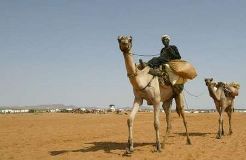Sudan says it will abide by ‘unfair’ UN resolution on Darfur
KHARTOUM, Sept 19 (AFP) — Sudan has condemned as “unfair” a new UN resolution calling on Khartoum to restore security to the crisis-wracked Darfur region or face possible sanctions, but said it would abide by the UN’s demands.
 However, the speaker of the Sudanese parliament cautioned the West on Sunday not to intervene in his country, warning that it risked opening the “gates of hell”.
However, the speaker of the Sudanese parliament cautioned the West on Sunday not to intervene in his country, warning that it risked opening the “gates of hell”.
The Sudanese embassy in Washington said the government was committed to the resolution “even though it was unfair and unjust to the Sudan”, according to a statement published by the independent Al-Sahafa newspaper.
The newspaper said the Sudanese cabinet would hold an extraordinary meeting on Sunday to discuss UN Security Council Resolution 1564, which threatens sanctions on the country’s vital oil industry.
The resolution was adopted Saturday by 11 votes to nil, with China, Russia, Algeria and Pakistan abstaining.
It warns that the Security Council “will envisage” sanctions against Sudan’s oil industry, after consulting with the African Union, unless Khartoum makes good on its promise to protect the population of Darfur.
The resolution was sponsored by the United States, which says Khartoum and its proxy Arab militias are guilty of genocide in Darfur.
An estimated 50,000 people have died and 1.4 million more have been displaced in Darfur, where UN officials say Janjaweed militias have carried out a scorched-earth campaign of ethnic cleansing against black residents.
The war broke out in February 2003 when rebels rose up against Khartoum to demand an end to the political and economic marginalisation of their region, peopled mainly by black non-Arab Africans.
Khartoum’s response was to back the Janjaweed and give it a free rein to crack down on the rebels and their backers.
But in a fiery tirade, parliament speaker Ibrahim Ahmed al-Taher warned Western nations not to intervene.
“If Iraq opened for the West one gate of hell, we will open seven such gates,” Taher was quoted as saying by the Sudanese Media Center, an information outlet affiliated to the government.
“We will not surrender this country to anybody.”
The UN vote came ahead of a week-long mission to Sudan by the UN High Commissioner for Human Rights, Louise Arbour, who was due to arrive later Sunday.
Kamal al-Obaid, an official with President Omar al-Beshir’s ruling National Congress, said the resolution contradicted a report by UN envoy Jan Pronk and accused the United States of “breaching all international values and norms”, Al-Sahafa reported.
He said the US offensive against Sudan “reflects a deficiency in the international system and shows that it administers the international affairs in a way that complicates things”.
Obaid said his government was committed to addressing the crisis in Darfur “not in response to the threat contained in the resolution but in pursuance of the government’s unchanging position of resolving all problems through dialogue”.
The UN resolution was adopted after three weeks of talks between Khartoum and Darfur rebels in Nigeria were suspended because of disagreements on key issues.
Khartoum’s chief delegate to the Abuja talks, Majzoub al-Khalifa Ahmed, said the resolution had been expected and accused Washington of using Darfur for political purposes ahead of the November presidential election, “forgetting the crimes it has committed in Iraq and elsewhere”, Al-Anbaa newspaper reported.
Ahmed said the oil sanctions provision was “part of a struggle between the US Chevron Company and China”, the main investor in Sudan’s oil sector, but did not elaborate.
Sudan produces an estimated 300,000 daily barrels of oil and has forecast oil exports would bring in almost two billion dollars this year.
